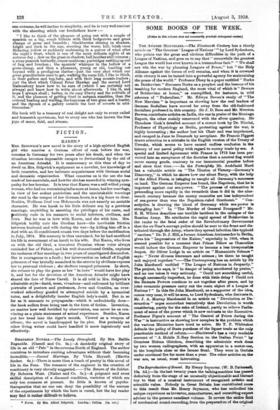SOME BOOKS OF THE WEEK.
[Notice in Chit column doe, not necemarily preclude subsequent review.] TICE AUGUST MONTI:MIDS.—The Nineteenth Oentury has a timely article on " The Greatest ' League of Nations ' " by Lord Sydenham, who points out the great and obvious difficulties in the path of a
League of Nations, and goes on to say that " meanwhile the greatest League the world has ever known is a tremendous fact." " We shall not win the war by planning Leagues of Peace," but " the Holy Alliance against the forces of evil remains, and when it is crowned
with victory it can be turned into apowerful agency for maintaining the peace of the world." Professor Dicey in a paper entitled " Burke on Bolshevism " discusses Burke as a prophet and the lessons of his teaching for modern England, the most vital of which is " Beware of Bolshevism at home," as exemplified, for instance, in wild schemes of " Federalism." Mr. Edwyn Bevan's study of " The New Marxism " is important as showing how the real leaders of German Socialism have moved far away from the old-fashioned Socialism professed in this country. Sir J. D. Rees and Mr. Moreton Frewen contribute articles on India, the one in praise of the Montagu Report, the other mainly oonoerned with the silver question. Sir Theodore Cook's detailed account of a recent book by Dr. Nicolai, Professor of Physiology at Berlin, protesting against the war, is highly interesting ; the author lost his Chair and was imprisoned, and escaped in June to Denmark by aeroplane. Sir Francis Piggott draws attention to a mistake in the English version of the Treaty of 17treeht, which seems to have caused endless confusion in the history of our naval policy with regard to enemy trade by sea. A special and limited Agreement with France in 1113 has been per- verted into an acceptance of the doctrine that a neutral flag would cover enemy goods, contrary to our immemorial practice before and since that time.—In the Fortnightly Mr. Archibald Hurd has a valuable article on " The Illusion of Victory—Germany's Discovery," in which he shows how our silent Navy, with the help of the Allied Fleets, is bringing to naught all Germany's successes on land. The German Emperor has found, like Napoleon, that he is impotent against our sea-power. " The process of exhaustion is proceeding more rapidly in the twentieth than it did in the nine- teenth century because the enemy countries are lees independent of sea-power than was the Napoleon-ruled Continent." " Con- scription is drawing the blood of Germany while sea-power is strangling her." In " The Murder of General Pourgasoff " Mr. E. H. Wilcox describes one terrible incident in the collapse of the Russian Army. He attributes the rapid spread of Bolshevism in the ranks to the fatal order of the Revolutionary Government that the ex-Tsar's corrupt police should be sent to the front and dis- tributed through the Army, where they spread infection like typhoid " carriers." Dr. D. J. Hill, a former American Ambassador in gives his " Impressions of the Kaiser," especially in 1908, when it seemed possible for a moment that Prince Billow as Chancellor would induce the German Emperor to become a lees irresponsible despot. Sir Oliver Lodge in an article on " Humanistic Science " says: " Never divorce literature and science ; let them be taught and enjoyed together."—The Contemporary has an article by Sir John Macdonell entitled " The League of Nations in Jeopardy." The project, he says, is " in danger of being smothered by praise," and no one takes it very seriously. " Could not something useful, though necessarily imperfect, be done with little delay f Could not the Entente Powers continue to act together after peace, and by joint economic' pressure carry out the main object of a League of Nations ? " In this Sir John Maodonell, as a supporter of the idea, comes very near, it will be seen, to Lord Sydenham, who distrusts it. Mr. J. A. Murray Macdonald in an article on " Devolution or De- atruction " urges somewhat tentatively that Devolution is worth considering, partly for the sake of Ireland, partly to relieve Parlia- ment of some of the power which it now entrusts to the Executive. Professor Pigon's account of " The Control of Prices during the War " is instructive as showing how complex is the problem which the various Ministries have tried to solve. Sir T. P. Whittaker defends the policy of State purchase of the liquor trade as the only practicable method of reform.—Blackwood's has a very readable account of " A Mobile X-Ray Section on the Italian Front " by Countess Helena Gleichen, describing the admirable work done by two women radiographers, with an apparatus in a motor-care in the hospitals close to the Isonzo front. They were in Gorizia under continual fire for more than a yeas. The other articles on the war are, as usual, most interesting.


























 Previous page
Previous page